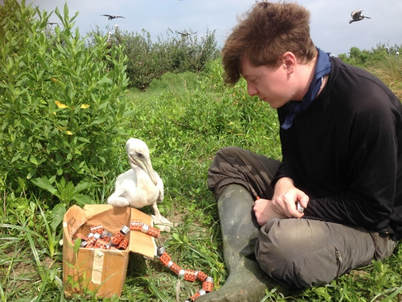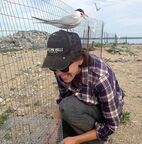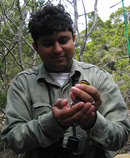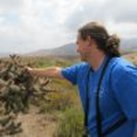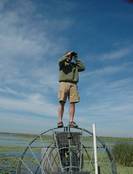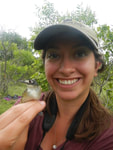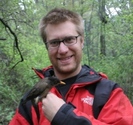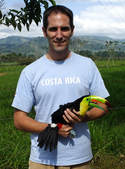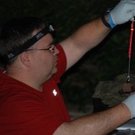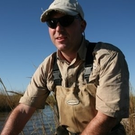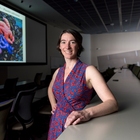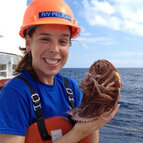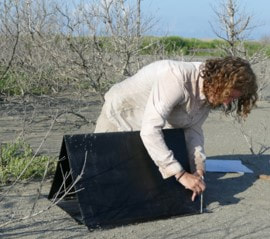
Andrea Santariello, Doctoral Student, 2018-Present
In response to climate change, local fish populations are changing their location. My current
research interests focus on the results of these shifts on breeding marine bird populations. Many marine bird species breed on coastal islands and are important indicators of local fish population health. The high visibility and reliable location of breeding seabirds makes them an important ‘bridge’ species between the marine ecosystem which they feed on and the terrestrial environment where they live and breed. I am also interested in how the changing coastal environment impacts the breeding behavior and success of seabirds. Due to rapid sea level change, frequent storms, and offshore oil activities, Louisiana’s barrier islands are experiencing rapid erosion. Many of these barrier islands are crucial breeding habitat for seabirds like Brown Pelicans, Black Skimmers, and several tern species. In an effort to preserve these barrier islands, extensive restoration has been done on several of the islands. To determine the relative success of the restoration on these islands in terms of island ecology, I am conducting research on the breeding behavior and success of various seabirds that breed on these islands. You can contact me at [email protected]
In response to climate change, local fish populations are changing their location. My current
research interests focus on the results of these shifts on breeding marine bird populations. Many marine bird species breed on coastal islands and are important indicators of local fish population health. The high visibility and reliable location of breeding seabirds makes them an important ‘bridge’ species between the marine ecosystem which they feed on and the terrestrial environment where they live and breed. I am also interested in how the changing coastal environment impacts the breeding behavior and success of seabirds. Due to rapid sea level change, frequent storms, and offshore oil activities, Louisiana’s barrier islands are experiencing rapid erosion. Many of these barrier islands are crucial breeding habitat for seabirds like Brown Pelicans, Black Skimmers, and several tern species. In an effort to preserve these barrier islands, extensive restoration has been done on several of the islands. To determine the relative success of the restoration on these islands in terms of island ecology, I am conducting research on the breeding behavior and success of various seabirds that breed on these islands. You can contact me at [email protected]
|
Brock Geary, Postdoctoral Reseracher, 2018-Present
My research aims to understand how animals navigate dynamic natural environments, with a particular interest in examining the foraging ecology at both individual and population levels. In the northern Gulf of Mexico, brown pelicans (Pelecanus occidentalis) must make efficient foraging decisions in order to reliably locate prey and meet the high energetic demands associated with breeding in this challenging environment. I am currently using GPS telemetry to determine connectivity between breeding colonies and foraging grounds throughout the region to assess how colony location and island restoration history influence pelican foraging efficiency and productivity, while also continuing my prior work on the foraging strategies and energetics of this important coastal species. This work will improve understanding of how barrier island restoration projects can generate positive outcomes for wildlife via the creation of high quality habitats, while also providing more basic insights into the ways that local environments and individual traits interact to shape fitness and demography in the wild. Feel free to contact me at [email protected]. |
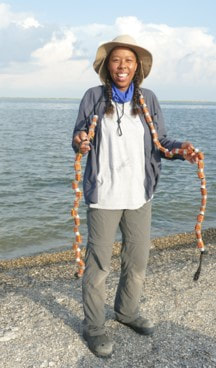
Juita Martinez, Doctoral Student, 2018-Present
Barrier islands found in coastal Louisiana serve as seabird breeding sites and provide
anthropogenic services. In order to mitigate barrier island loss, restoration began in the
early 1990s and continues to be a focus today. My research involves investigating the
effects of restoration practices on Eastern brown pelican (Pelecanus occidentalis
carolinensis) population dynamics and breeding ecology with the use of remote camera
monitoring systems. I am also interested in utilizing toxicology techniques to assess
potential physiological threats in this system. In conjunction with mapping programs I
plan to investigate island characteristics and predator presence to assess seabird
population trends in Louisiana. Please feel free to contact me at
[email protected].
Barrier islands found in coastal Louisiana serve as seabird breeding sites and provide
anthropogenic services. In order to mitigate barrier island loss, restoration began in the
early 1990s and continues to be a focus today. My research involves investigating the
effects of restoration practices on Eastern brown pelican (Pelecanus occidentalis
carolinensis) population dynamics and breeding ecology with the use of remote camera
monitoring systems. I am also interested in utilizing toxicology techniques to assess
potential physiological threats in this system. In conjunction with mapping programs I
plan to investigate island characteristics and predator presence to assess seabird
population trends in Louisiana. Please feel free to contact me at
[email protected].
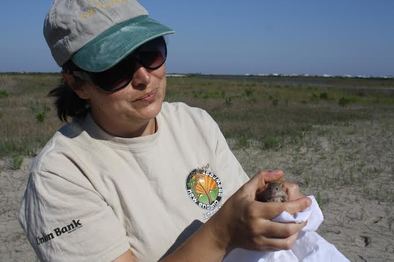
Mirka Zapetal, Doctoral Student, 2013-2022
My research interests focus around insectivore and mesocarnivore conservation, including ecosystem roles, such as seed dispersal, and human-carnivore conflict. For my MS research, I investigated habitat selection by Daurian hedgehogs (Mesechinus dauuricus) in the arid Gobi Steppe of Mongolia. My doctoral project is focused on mammalian carnivore ecology within Louisiana’s coastal zone. I am investigating carnivore species distribution, diet, and how both may be impacted by climate change. I also work with high school students to provide field experience and a direct connection to conservation issues. I can be reached at m[email protected] or visit my web site.
My research interests focus around insectivore and mesocarnivore conservation, including ecosystem roles, such as seed dispersal, and human-carnivore conflict. For my MS research, I investigated habitat selection by Daurian hedgehogs (Mesechinus dauuricus) in the arid Gobi Steppe of Mongolia. My doctoral project is focused on mammalian carnivore ecology within Louisiana’s coastal zone. I am investigating carnivore species distribution, diet, and how both may be impacted by climate change. I also work with high school students to provide field experience and a direct connection to conservation issues. I can be reached at m[email protected] or visit my web site.
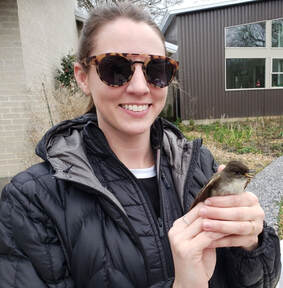
Bonnie Slaton, Master’s Student, 2021-Present
Coastal islands in the Terrebonne and Barataria basins of Louisiana are critical habitats for
several threatened seabird species facing range-wide impacts due to climate change via
increased sea level rise, erosion, and storm occurrence. My research focuses on the effects of major storms (Hurricane Ida) and barrier island restoration on successional processes that control avian populations. I compare extensive pre-storm and current island conditions,
assessing restored and unrestored islands and the wildlife that inhabit them, using Eastern
brown pelicans (Pelicanus occidentalis) as my focal species. I investigate the breeding ecology of brown pelicans and the presence of mammalian predators on Louisiana’s barrier islands using non-invasive camera monitoring systems. Ultimately, this project will help inform future restoration practices that will support seabird breeding colonies along Louisiana’s coast.
Coastal islands in the Terrebonne and Barataria basins of Louisiana are critical habitats for
several threatened seabird species facing range-wide impacts due to climate change via
increased sea level rise, erosion, and storm occurrence. My research focuses on the effects of major storms (Hurricane Ida) and barrier island restoration on successional processes that control avian populations. I compare extensive pre-storm and current island conditions,
assessing restored and unrestored islands and the wildlife that inhabit them, using Eastern
brown pelicans (Pelicanus occidentalis) as my focal species. I investigate the breeding ecology of brown pelicans and the presence of mammalian predators on Louisiana’s barrier islands using non-invasive camera monitoring systems. Ultimately, this project will help inform future restoration practices that will support seabird breeding colonies along Louisiana’s coast.
Web sites of some lab graduates. For a complete list of current and former graduate students, see Paul Leberg's CV.
|
Paige Byerly, Postdoctoral Associate, Smithsonian's National Zoo and Conservation Biology Institute
Giri Athrey, Assistant Professor, Texas AM Kelly Barr, Doctoral Student, UCLA Clay Green, Associate Professor, Texas State Samantha Hauser, Postdoctoral Researcher, University of Wisconsin-Milwaukee Alan Hitch, Assistant Curator, UC Davis Katrina Hucks, Biologist, Hawks Aloft, NM Landon Jones, Postdoctoral Researcher, Purdue University Richard Lance, Research Biologist, ERDC, US Army Eric Liebgold, Assistant Professor, Salisbury University Shannon Martin, Scientist, NOAA's Gulf of Mexico Integrated Ecosystem Assessment Program Kevin Purcell, Chief Data Scientist at Wildfig.com and adjunct professor at Harrisburg State Dave Rogowski, Biologist, Arizona Fish and Game Dept. Christine Spencer, Academic Professional, Georgia Tech Jessica Schulz Peacock, Ecologist, Ducks Unlimited Scott Walter, Instructor, Texas State and Institute for Tropical Biology |
